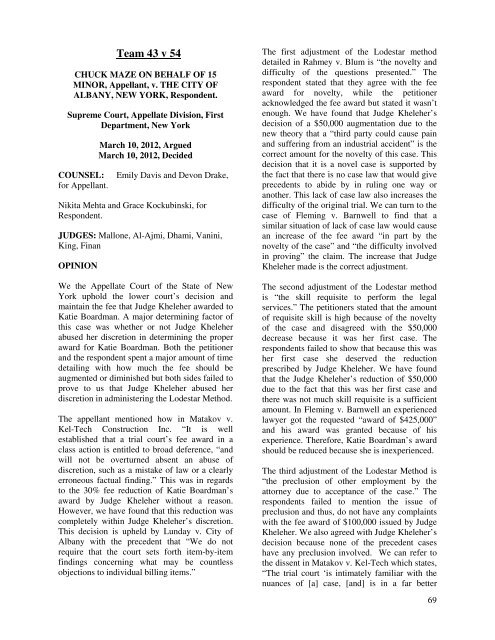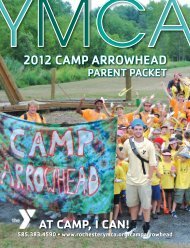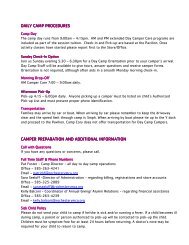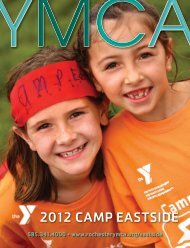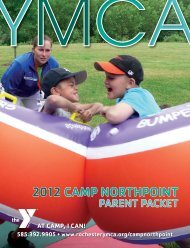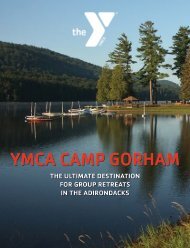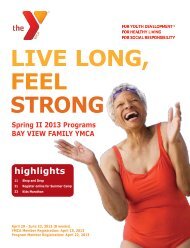2012 Conference Executive Record Report.pdf - YMCA of Greater ...
2012 Conference Executive Record Report.pdf - YMCA of Greater ...
2012 Conference Executive Record Report.pdf - YMCA of Greater ...
You also want an ePaper? Increase the reach of your titles
YUMPU automatically turns print PDFs into web optimized ePapers that Google loves.
Team 43 v 54<br />
CHUCK MAZE ON BEHALF OF 15<br />
MINOR, Appellant, v. THE CITY OF<br />
ALBANY, NEW YORK, Respondent.<br />
Supreme Court, Appellate Division, First<br />
Department, New York<br />
COUNSEL:<br />
for Appellant.<br />
March 10, <strong>2012</strong>, Argued<br />
March 10, <strong>2012</strong>, Decided<br />
Emily Davis and Devon Drake,<br />
Nikita Mehta and Grace Kockubinski, for<br />
Respondent.<br />
JUDGES: Mallone, Al-Ajmi, Dhami, Vanini,<br />
King, Finan<br />
OPINION<br />
We the Appellate Court <strong>of</strong> the State <strong>of</strong> New<br />
York uphold the lower court’s decision and<br />
maintain the fee that Judge Kheleher awarded to<br />
Katie Boardman. A major determining factor <strong>of</strong><br />
this case was whether or not Judge Kheleher<br />
abused her discretion in determining the proper<br />
award for Katie Boardman. Both the petitioner<br />
and the respondent spent a major amount <strong>of</strong> time<br />
detailing with how much the fee should be<br />
augmented or diminished but both sides failed to<br />
prove to us that Judge Kheleher abused her<br />
discretion in administering the Lodestar Method.<br />
The appellant mentioned how in Matakov v.<br />
Kel-Tech Construction Inc. “It is well<br />
established that a trial court’s fee award in a<br />
class action is entitled to broad deference, “and<br />
will not be overturned absent an abuse <strong>of</strong><br />
discretion, such as a mistake <strong>of</strong> law or a clearly<br />
erroneous factual finding.” This was in regards<br />
to the 30% fee reduction <strong>of</strong> Katie Boardman’s<br />
award by Judge Kheleher without a reason.<br />
However, we have found that this reduction was<br />
completely within Judge Kheleher’s discretion.<br />
This decision is upheld by Lunday v. City <strong>of</strong><br />
Albany with the precedent that “We do not<br />
require that the court sets forth item-by-item<br />
findings concerning what may be countless<br />
objections to individual billing items.”<br />
The first adjustment <strong>of</strong> the Lodestar method<br />
detailed in Rahmey v. Blum is “the novelty and<br />
difficulty <strong>of</strong> the questions presented.” The<br />
respondent stated that they agree with the fee<br />
award for novelty, while the petitioner<br />
acknowledged the fee award but stated it wasn’t<br />
enough. We have found that Judge Kheleher’s<br />
decision <strong>of</strong> a $50,000 augmentation due to the<br />
new theory that a “third party could cause pain<br />
and suffering from an industrial accident” is the<br />
correct amount for the novelty <strong>of</strong> this case. This<br />
decision that it is a novel case is supported by<br />
the fact that there is no case law that would give<br />
precedents to abide by in ruling one way or<br />
another. This lack <strong>of</strong> case law also increases the<br />
difficulty <strong>of</strong> the original trial. We can turn to the<br />
case <strong>of</strong> Fleming v. Barnwell to find that a<br />
similar situation <strong>of</strong> lack <strong>of</strong> case law would cause<br />
an increase <strong>of</strong> the fee award “in part by the<br />
novelty <strong>of</strong> the case” and “the difficulty involved<br />
in proving” the claim. The increase that Judge<br />
Kheleher made is the correct adjustment.<br />
The second adjustment <strong>of</strong> the Lodestar method<br />
is “the skill requisite to perform the legal<br />
services.” The petitioners stated that the amount<br />
<strong>of</strong> requisite skill is high because <strong>of</strong> the novelty<br />
<strong>of</strong> the case and disagreed with the $50,000<br />
decrease because it was her first case. The<br />
respondents failed to show that because this was<br />
her first case she deserved the reduction<br />
prescribed by Judge Kheleher. We have found<br />
that the Judge Kheleher’s reduction <strong>of</strong> $50,000<br />
due to the fact that this was her first case and<br />
there was not much skill requisite is a sufficient<br />
amount. In Fleming v. Barnwell an experienced<br />
lawyer got the requested “award <strong>of</strong> $425,000”<br />
and his award was granted because <strong>of</strong> his<br />
experience. Therefore, Katie Boardman’s award<br />
should be reduced because she is inexperienced.<br />
The third adjustment <strong>of</strong> the Lodestar Method is<br />
“the preclusion <strong>of</strong> other employment by the<br />
attorney due to acceptance <strong>of</strong> the case.” The<br />
respondents failed to mention the issue <strong>of</strong><br />
preclusion and thus, do not have any complaints<br />
with the fee award <strong>of</strong> $100,000 issued by Judge<br />
Kheleher. We also agreed with Judge Kheleher’s<br />
decision because none <strong>of</strong> the precedent cases<br />
have any preclusion involved. We can refer to<br />
the dissent in Matakov v. Kel-Tech which states,<br />
“The trial court ‘is intimately familiar with the<br />
nuances <strong>of</strong> [a] case, [and] is in a far better<br />
69


